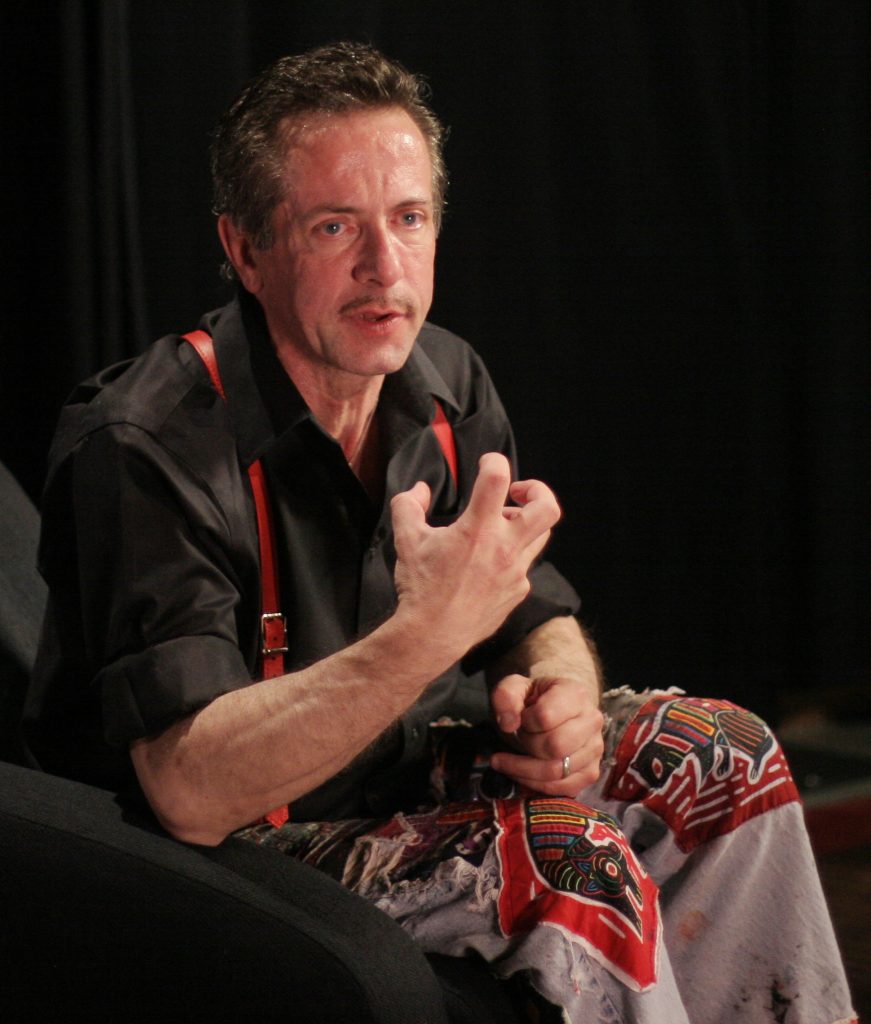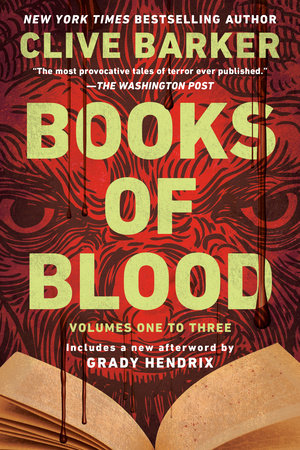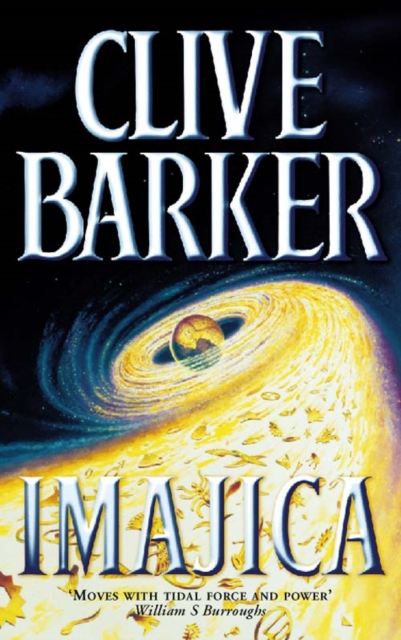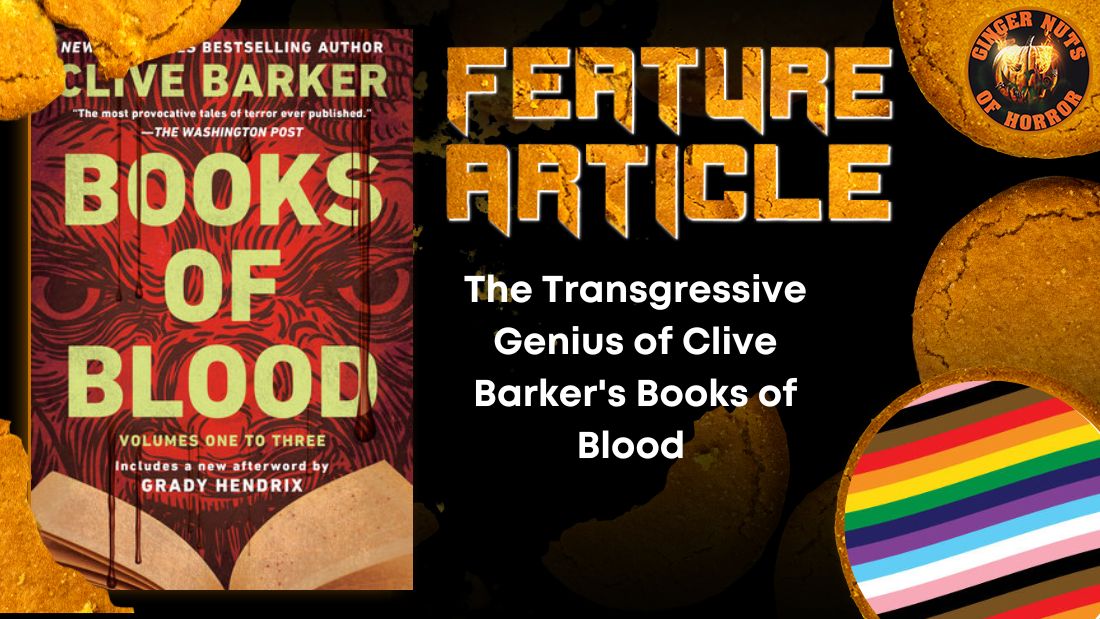Hardly any writer -certainly in horror- explored themes and subjects like this at the time of writing, and certainly not with the degree of philosophic ambiguity that resonates from every tale: here, it is extremely rare that a monster is banished or expelled, rarer still that the monster is exclusively monstrous: more often, the protean degrees of amibguity that pervade his narratives infect every element, character and creature, making entities that would be unambgiously evil and sources of horror in, say, the work of Stephen King or Ramsey Campbell, instead sources of strange and distressing empathy.
Penguin Random House is about to unleash the Books of Blood by horror icon Clive Barker. This reissue will be adorned with a fresh, captivating cover, a new introduction penned by Clive himself, and an enlightening afterword by the rising star of horror, Grady Hendrix.
As we celebrate the re-release of this classic collection of horror short stories, we have risked life and limb and entered the dark purgatory dimensions of the archive of the first Ginger Nuts of Horror website, which was hacked and destroyed by forces unknown, to rescue George Daniel Lee’s excellent article looking at the influence, impact and importance of the Books of Blood. This is a celebration of horror literature, an event that all fans should eagerly anticipate.
The Transgressive Genius of Clive Barker’s Books of Blood

Clive Barker, a name that is as synonymous with horror fiction and cinema as Stephen King, that, at the zenith of its output, utterly blasted apart the parameters of not only horror but popular fiction in general.
Even now, being so familiar with the man’s work (I am one of those salivating fan-boys who re-reads Barker’s entire back catalogue at least once a year, every year), I find myself utterly dumb-founded as to how said work rose to become the phenomena it has, not because of any failing on its behalf -far, far from it-, but because it is so deviant, so transgressive, so powerfully beyond what any other writer in the many genres Barker is traditionally categorised as belonging to were attempting or imagining in his heyday, it’s nothing short of a miracle that it did not result in torches and pitchforks at Barker’s door (metaphorically and literally speaking).
Barker, of course, is most commonly associated with the art-house-horror-made-good that is Hellraiser, a film whose peculiar deviance became the source of its appeal back in the saturated horror cinema of the early-to-mid 1980s, that did away with the already weary formula of unkillable, masked murderer stalks teenagers and opted for something entirely other; a dynamic of Freudian family neuroses married to Jungian metaphysics and deviant sexuality, the introduction of images and ambiguities that horror audiences simply were not used to, but which they devoured with atavistic appetite.
However, it was The Books of Blood, several volumes of short stories, with which Barker made his literary debut, stories whose variety, deviance and insane quality of writing still leave me trembling with simultaneous admiration and a despair that I will never, never produce anything of even remotely the same gravitas.

The Books of Blood are stories the like of which no other writer of horror or fantasy or even science fiction were writing at the time; bizarre, abstruse and impressionist tales of sex and disease, of violence and mutilation, of -peculiarly for Barker- politics and philosophy, stories that dredge through every sublimated inch of the collective sub-conscious, that explore elements of humanity that even other horror writers regarded as too transgressive and near-the-knuckle.
Here, the dirt and filth and desire of humanity is simultaneously lamented and celebrated. Characters that are morally ambiguous at best find themselves exposed to situations and experiences that transform them utterly, on every level of their beings (ideological, psychological, anatomical). Characters mutilate themselves, find their bodies rebelling against them. Characters physically split and peel away from themselves, transforming into monstrous abstractions. Characters discover the secret mechanisms of the world and despair at their insanity, their arbitrariness. Here, reality is a protean playground of hallucinogenic dirt, of emotional filth and animal urges married to the inspirations of demons and angels, of monsters and lunatic gods.
The horrific and fantastical elements of some stories alone would be enough to make them worthy of comment: a fundamentalist Christian and neo-liberal capitalist taking it upon himself to draw God from hiding by first stirring Satan himself by crafting a literal Hell-on-Earth that Lucifer could not possibly resist. A tribe of other-worldly women that have the capacity to transform the physical sex of the men they seduce into another of their kind.
Tribes of adoring monsters that inhabit the deserts and hinterlands of humanity’s dominions, siring hybrid children with willing, human mothers. An ancient statue that slowly, slowly seeps at the life and identity of those who come across it, becoming more lamentably human, whilst the human beings it parasitically emulates grow less and less so, and not without a degree of relief. The subjects of these stories alone act as a kind of metaphorical commentary: here, Barker sets out a manifesto for his visions, a kind of ideological itinerary of his fascinations, obsessions and the stances he takes upon them:
Politics and the ways of society are moribund, arbitrary and cruel: there is no hope in them. Tradition and religion are, likewise, corrupt and power-hungry and abusive. No salvation there. Human beings themselves are animal and cowardly and lunatic at their cores, revealing truer faces behind the masks of skin they wear than they ever could whilst still able to smile. We can find no salvation through one another.
Instead, there is only transcendence through ultimate transgression, Barker seems to insist: that those who cleave to old identities, to proscribed patterns and tribes and states of being, will always fall foul of them.
In perhaps one of the most infamous stories from the collection, The Midnight Meat Train, Barker frames what might have otherwise been a divertingly grotesque and distressing serial-killer story as something far more abstruse: a commentary upon the nature of politics and society at large, in which the central serial killer is not some random lunatic or obsessive psychopath.
But a product and executor of systems and traditions proscribed by the mechanisms of society itself, a secret that all who exercise any degree of power know about, but are sworn from discussing or even referencing, for fear of bringing all of society collapsing down around them. Those taken and slaughtered are the grist to the mill, the raw matter sluiced through the systems of civilisation, and fed to the monsters that lie at its heart.

Here, Barker firmly establishes himself as a distant outsider, an external voyeur of society’s various hypocrises, sicknesses and unspoken malevolences; an apolitical, almost anarchistic soul, who yearns not for revolution -which will inevitably result in the establishment of new forms of the same systems-, but for collapse, an apocalypse that will shake all of civilisation to its foundations and beyond, that will force humanity to reinvent itself, abandon old cruelties and casual atrocities or surrender to its own suicide.
Very, very few horror writers of the era take such an elegantly expansive, nihilistic approach to their stories, in which traditional meta-narratives are not reinforced but eroded by their exposure, quietly commented upon without any overt political didactism or finger wagging, but with a weary distance and distaste, Barker acknowledging their inevitablity as strongly as he stresses his defiance of them.
That ambiguity, that complexity of theme and subject, would have been more suited to certain more niche realms of fiction, certainly in the early to mid 1980s, and yet, Barker managed to accrue hordes of fascinated and obsessed fans for his work (myself not least amongst them, though my obsession wouldn’t begin until somewhat later, owing to my not being born at the time), tapping into a vein of transgressive desire, disenfranchisement and utter despair at established systems and assumptions, daring to express and explore it in ways that would have been career suicide for many, many others.
Take, for example, the abject body horror of The Body Politic, a story in which the hands of humanity are incited to bloody revolution against their enslavers, resulting in a grizzly horror-slap-stick in which hands claw out eyes, crush throats, rip out tongues, hack and gouge themselves free of the body entire.
Beyond the obvious black comedy of its subject and the situations that result, The Body Politic also stands as a commentary on how far we collectively are from losing everything, from whatever fragile delusion of control we exercise -even over something so familiar and assumed as our own bodies- collapsing. The story stands not only as Barker’s bleak commentary on our biological conditions but also on our structures, our assumptions, our traditions: such things, it seems, cannot last in the world Barker perceives: they will inevitably turn on us, become sources of horror in and of themselves.
The story also has the rather naughty effect of making the reader paranoid about their own anatomies: what other rebellions might parts of them they don’t even consciously acknowledge experience? What manner of mutilation might be visited on them as a result? In that, Barker also taps into certain Croenbergian concerns of 1980s culture regarding the human body; its proscribed standards of beauty or perfection, its health, its inevitable decay.

This is a very different man and a very different writer from the one who would come to write the likes of Imajica and Weaveworld: whereas that man has foregone and abandoned politics entirely, the writer of The Books of Blood is still engaged with those phenomena, obsessed by the same systems and mechanisms that revolt him, conjuring the more fantastical elements of his work in direct response to them, as a means of escape, as a means of shame and corrosion by contrast.
This may very well be a product of Barker’s circumstances: as a barely employed, barely homed sometimes-actor, writer and artist, he was still very much prey to those systems he comments upon, still very much a parasite within the guts of the beast, provided unenviable and intimate view of its inner workings.
But Barker’s commentaries are not excluded to the merely political:
Returning to The Books of Blood specifially for the purposes of this article, I found myself shocked and delightfully flabberghasted all over again by the sexual and gender politics of the works:
As a gay man, Barker’s place and influence within the horror of the era was already notable (the genre then being predominated by straight men).
This identity, along with the experiences that are part and parcel, seem to have informed a great deal of his writings: the obvious BDSM element of Hellraiser and its Cenobites, Barker’s preoccupation with romanticising the monstrous and demonising tradition-drugged humanity (at the time of writing, Barker would have certainly faced more as a gay man in the way of privation and public contempt than those born later in the UK, such as myself, which makes it hardly surprising that he exercises a healthy contempt for societal systems and historical institutions that would have been the enshrined means of his persecution).
In The Books of Blood, this aspect is thematically both pervasive and specific: the air of ambiguity that surrounds most of the tales, their lack of moral absolutism, is certainly more redolent of a writer operating on the outer bounds of culture -for whatever reason- than one comfortably nestled in its bread basket. Likewise, the stories take a despairingly honest approach to examining elements of humanity that many of Barker’s straight contemporaries simply did not or shyed away from.
Barker’s position as a “deviant,” an entity transgressive by its very nature, allowed him license to perceive, to conclude and to express in ways that, arguably, his straight counterparts were denied, resulting in tales whose conclusions are distressingly open-ended, lacking in moral judgement or certitude, in which monsters, more often than not, become the identifable and sympathetic parties, whereas the forces and faces of humanity are painted as antagonists.
Specifically, several of the stories not only include gay men as their protagonists (In The Hills, The Cities, Human Remains), but also explore the phenomena of sex and gender (The Madonna, Scapegoats, Jacqueline Ess: Her Will and Testament).
The former generally don’t obsess or preoccupy themselves with the experience of identifying as gay (Barker would not specifically explore that until later, in the seminal Sacrament) but rather inorporate gay characters with a casuistry that was certainly notable at the time of publication. Whilst LGBTQ characters weren’t exactly unknown in the popular horror of the 1980s, there was a tendency for them to be stereotypes and cyphers rather than characters in and of themselves: tertiary or redundant at best, made-to-slaughter victims and monsters at worst.
Barker, identifying as gay himself, incorporates gay characters in his early fiction without particular fanfare, the characters occurring naturally as part of their respective stories rather than drawing any particular attention to their status. That said, nor does Barker shy away from some of the more ribald or overt elements of being gay: In The Hills, The Cities and Human Remains both contain casual but graphic details of gay sex and relationships, which were likely many contemporary reader’s first exposures to such things.
In and of itself, this is noteworthy, especially given that there was no one of Barker’s status or arena of operation that incorporated LGBTQ characters into their fiction in this manner, and certainly none that explored themes and issues relevant to LGBTQ individuals in the way that he does.
Perhaps more notable than the mere inclusion of gay men as protagonists of his fiction is the manner in which he subversively explores themes and issues that are powerfully relevant to them but without allowing his stories to descend into shrill screeds or protests: barring the fact of the inclusion of gay characters, casual readers would be forgiven for not perceiving those factors of the fiction at all.
In the Hills, The Cities is perhaps less notable in this regard, in that its wider commentary is more an exploration of culture and tradition and the manifest, self-destroying insanity it can (and often does) perpetuate:
In this, the gay characters are cast as culture casts Barker himself: as voyeurs and commentators on the phenomena of society, pushed by their natures to the outskirts and beyond, seeing with both the wonder and repugnance of exiles or aliens. It is no accident that the two who bear witness to the mythic tragedy of the eponymous twin cities are themselves gay and divorced from the phenomena of unity that they manifest by myriad barriers and boundaries: their sexuality, their status as tourists and their individualism as anglophones renders them apart from events in a manner that lends them particular eyes.
Later, when one of the men seeks to share that unity, the oneness that the giants born of the twin cities represent, he is murdered by that desire, left to swing helplessy from a rope in a manner distressingly redolent of the lynchings that gay men have historically been subjected to (alongside numerous other tribes and demographics considered to be “outside” the fish bowl).
Human Remains, meanwhile, is much more overtly a “gay” story, or at least, a story that LGBTQ men and women will more readily identify with:
A much more intimate tale of identity and its simultaneous accrual and loss, it follows a young gay man who, it has become apparent in recent years, is very much an avatar of Barker himself (Barker recently revealed that, in his years of impecunity following university, he was forced to “turn tricks” as a rent-boy on the streets of London, just to keep a shelter over his head and to prevent himself from starving). The protagonist here operates in the same circles, making his living providing “company” and companionship to lonely men who themselves may or may not identify as gay, but crave him to temporarily salve their wounded, empty lives.
In this, the story is not so much an exploration of identifying as gay (at least, not exclusively so) as it is one of identifying as male, the need for intimacy and understanding that many of us crave but are denied and kept from admitting by cultures that demand false and corrosive stoicism from us here made overt, the lonely, confused and uncertain men the protagonist beds only an inch removed from their one-night lover himself, who operates with a strange and nihilistic vacuum in place of his soul.
Supernatural elements help to write large the theme of identity, in the form of a kind of vampire: a living statue that slowly leeches away the form and identity of those it comes into contact with, eventually becoming them in ways that almost supercede the original. In this, Barker’s work carries echoes of science fiction not a million miles away from that of Phillip K. Dick, whose work also often revolves around the central themes of identity, its protean and flimsy nature, the degree to which it can be simulated, contrived and rearranged.
The fact that the protagonist is gay is of particular note, and resonates with themes that Barker explores later in his novel Sacrament: being a gay man, the story seems to imply, forces us outside of traditional, proscribed narratives and roles that often provide or impose identity on our straight counterparts. Whilst in the later Sacrament that is explored in terms of its potential, here it is far more ambiguous, in that it is neither celebrated nor entirely bemoaned; merely commented upon.
There is certainly, at the story’s conclusion, a subtle suggestion that losing what one considers to be essentially oneself is no terrible thing, that there is a freedom to be found in it. But the story never makes any overt statement in that regard one way or the other, leaving it up to the reader to engage and determine their own significance.
Stories such as The Madonna utilise fantastical and hallucinatory imagery so strange as to be near surreal in order to explore notions of sex and gender, how miraculously fluid those notions can be. Here, a tribe of strange women -who are presented as almost alien in their characters, if not their anatomies- enjoy the patronage of an entity that is almost Lovecraftian in its strangeness and elemental qualities, but not at all in terms of its nature and implications: an amorphous, indescribable creature, it is portrayed as some elemental manifestation of womanhood, a mother that can “…make children from rain,” if it so chooses.
Meanwhile, the male characters contrasted to them (all assiduously straight) are portrayed as ignorant, neurotic, violent, entitled children, from a man who reacts with self-mutilating violence when his anatomy is transformed to resemble that of the tribe themselves to another who stumbles into their midst in total confusion, finally taken into their sisterhood and some condition beyond at the story’s climax.
The Madonna sets out certain themes and subjects that will recur again and again in the fiction that Barker will produce in later years: the reverence of women, the folly of men, the metaphysical reconciliations that occur between them.
As in most of these stories, men are not necessarily portrayed in a positive light: Barker expresses as much sympathy for women as he does for his own tribe of gay men, whilst not falling into the Tolkienesque trap of elevating them into a different form of archetypal bondage:
Jacqueline Ess: Her Will and Testament tells the tale of a woman who is perpetually the victim of the men in her life, until she discovers capacities that allow her to bend reality (including the meat and matter of her oppressors) to her will. Interestingly, the elevation that this condition provides is not enough to save her; she finds herself dissatisfied with every condition that follows, including a status not a million miles away from divine, until she turns her powers on herself, finally ending her own existence.
In this, Barker paints a fairly despairing portrait of how our damage follows us and haunts us perpetually, no matter what steps we take to elevate ourselves from it. The core theme of identity, its loss or vandalism, its theft or abandonent, recurs again and again and again, which, once more, would be highly significant to Barker as a gay man, living in the status he was at the time of writing.
Likewise, Scapegoats paints an unflattering portrait of male sexuality and its links to violence, aggression and myriad negative elements that have become correlated with the sex, how bestial and animalistic lunacy simmers barely an inch beneath the mask of every bronzed and toned pretty boy.
Hardly any writer -certainly in horror- explored themes and subjects like this at the time of writing, and certainly not with the degree of philosophic ambiguity that resonates from every tale: here, it is extremely rare that a monster is banished or expelled, rarer still that the monster is exclusively monstrous: more often, the protean degrees of amibguity that pervade his narratives infect every element, character and creature, making entities that would be unambgiously evil and sources of horror in, say, the work of Stephen King or Ramsey Campbell, instead sources of strange and distressing empathy.
That Barker managed to accrue a popular audience with this kind of profoundly transgressive material is nothing short of a minor miracle, even more so that the works are in no way exclusive to any particular demographic or audience: whilst many of the themes and subjects he explores are particular to the experience of being LGBTQ, they are by no means exclusive to it. In that, Barker does not exclude or hem in: he does not exercise a cultish quality, but rather, leaves the door open, allowing the parameters between tribes to dissolve in common confusions.
His principle obsession is the commonality of our distresses, our ambiguities, our neuroses as human beings, as an animal that aspires from apehood to imagine angels and demons, that has the capacity to be both and neither and more than their sum.
In that exploration, Barker has rarely, if ever, been equalled.
The Books of Blood by Clive Barker
Rediscover the true meaning of fear in this collection of horror stories from New York Times bestselling author Clive Barker—now with a new Afterword by Grady Hendrix!
“The most provocative tales of terror ever published.”—The Washington Post
Everybody is a book of blood; wherever we’re opened, we’re red…
With the publication of Books of Blood, Clive Barker became an overnight literary sensation. His tour de force collection of brilliantly disturbing tales demonstrated a genius for dark invention that rivaled Poe and Sade. He was hailed by Stephen King as “the future of horror,” and won both the British and World Fantasy Awards.
Now, with his numerous bestsellers, graphic novels, and hit movies like the Hellraiser films, Clive Barker has become an industry unto himself. It is his powerful writing style and arresting imagery that have made Books of Blood a classic—and Clive Barker a cult phenomenon.
INCLUDES AN INTRODUCTION BY THE AUTHOR AND A NEW AFTERWORD BY GRADY HENDRIX.
Horror Features on Ginger Nuts of Horror
If you’re a fan of spine-chilling tales and hair-raising suspense, then you won’t want to miss the horror features page on The Ginger Nuts of Horror Review Website. This is the ultimate destination for horror enthusiasts seeking in-depth analysis, thrilling reviews, and exclusive interviews with some of the best minds in the genre. From independent films to mainstream blockbusters, the site covers a broad spectrum of horror media, ensuring that you’re always in the loop about the latest and greatest.
The passionate team behind The Ginger Nuts of Horror delivers thoughtful critiques and recommendations that delve into the nuances of storytelling, character development, and atmospheric tension. Whether you’re looking for hidden gems to stream on a dark and stormy night or want to explore the work of up-and-coming horror filmmakers, this page is packed with content that will ignite your imagination and keep you on the edge of your seat.
So grab your favourite horror-themed snacks, settle into a cosy spot, and immerse yourself in the chilling world of horror literature and film. Head over to The Ginger Nuts of Horror and embark on a journey through the eerie and the extraordinary. It’s an adventure you won’t soon forget!


